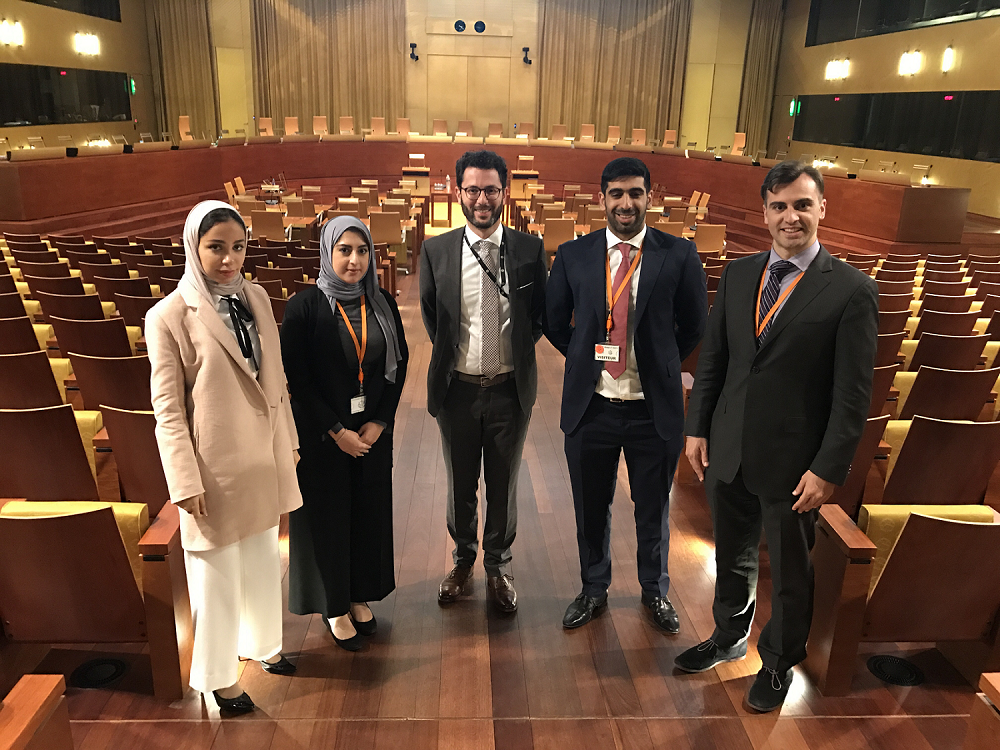
Students from Hamad Bin Khalifa University’s (HBKU) College of Law & Public Policy (CLPP) made it to the semi-finals of the 4th EUROPA Moot Court Competition held in Greece. HBKU was the first university from outside the European Union to participate in the competition, and the team of four had the unique opportunity to engage with law students and academics from across Europe.
HBKU Law School’s Juris Doctor (JD) candidate, Aisha Al-Naama bagged one of the Best Oralist Awards at the competition. Also representing the College were her peers Khalid Al-Ansari, Asma Al-Khulaifi and Mohammed Al-Ahmadani, competing against seven top European law schools.
Commenting on the accolade and her experience at the competition, Aisha Al-Naama said: “Taking part in the EUROPA Moot Court Competition was a great opportunity to gain exposure to the EU legal and court system. As the only non-EU University, competing against leading Universities in Europe, reaching the finals, and winning best oralist, are all important indicators of Hamad Bin Khalifa University’s quality teaching delivered by its faculty, and the great potential JD students hold being well equipped to take part in international settings.”
The panels of judges for the Moot Court Competition comprised of the former President of the Court of Justice of the European Union (CJEU), the First Advocate General and law clerks of the Court, and academics from all over the European Union. The competition focused on issues of European Union law, migration and refugee law, and Islamic law.
Speaking about his experience at the competition, Mohammed Al-Ahmadani said: “It provided us with the opportunity to learn more about the legal system of the European Union and some of the interesting legal questions the Court of Justice of the European Union deals with. It was also an honor to be the first non-EU University to compete, and making it to the last rounds made the experience that much better.”
The Moot court competition was organized by the Chambers of the First Advocate General of the CJEU, Melchior Wathelet, and the Mohammed Ali Research Center, a Greek private non-profit, non-governmental research center that focuses on the Muslim contribution to the shared scientific and technological heritage of the world.
Georgios Dimitropoulos, Assistant Professor at HBKU’s College of Law & Public Policy, who coached the team said: “It was a great experience for our students. They had the chance to get exposed to the intricacies of European Union law, at the complicated junctures between EU law, international law and Islamic law, improve their advocacy skills, and interact with Judges, Advocates General and clerks at the Court of Justice of the European Union, as well as students from all over Europe. It was a very fruitful exchange and the Law School has been already invited to the next year’s 5th edition of the EUROPA Moot Court Competition.”
On the invitation of Dr. Paschalis Paschalidis, Legal Secretary at the Chambers of the First Advocate General of the CJEU, the team got the chance to visit the premises of the CJEU in Luxembourg, met with law clerks of the Court, and attended a hearing concerning the European Union Law aspects of the refugee and migration crisis in Europe. The team also visited the area of Schengen, where the Schengen Agreement on the abolition of checks at the common borders of EU countries was signed.
Dr. Paschalis Paschalidis said: “I am delighted that a group of HBKU students took the time to pay a visit to the EU’s highest court. It is a rare event to receive visits from universities situated outside the European Union and such opportunities that lead to a mutually beneficial exchange of ideas should be encouraged.”
The students’ visit to the CJEU in Luxembourg gave them the chance to witness first-hand how the Court operates and how EU law works in practice.
JD candidate and team member, Asma Al-Khulaifi, commented on her experience, saying: “Our participation in the EUROPA Moot Court Competition and our visit to the Court of Justice of the European Union helped us to better-understand the discourse currently taking place on ways to circumvent the current global refugee crisis, further our study in the application of EU law and develop our skills in oral argument. More interestingly, we were able to witness first-hand how the CJEU highlighted in their discussions the concepts of solidarity, sovereignty and possible dislocation of the EU institutions.”





